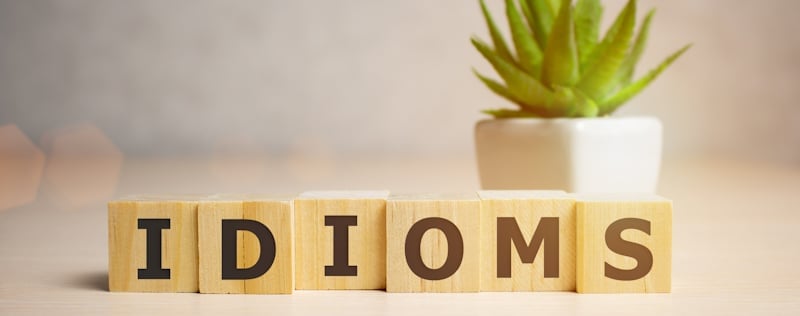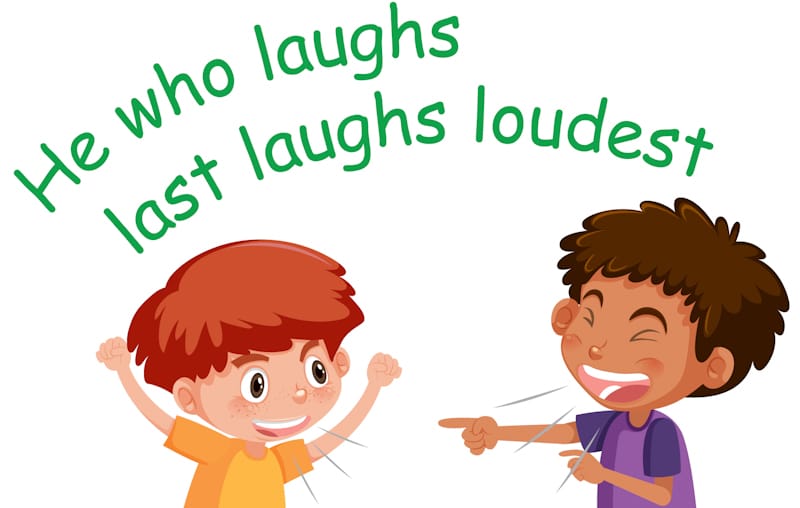English has its fair share of idioms and phrases. Some are pretty straightforward to understand, but quite a few could be complex. Even the ones that look simple at first could turn out tricky upon further review.
The phrase “he who laughs last, laughs loudest” denotes “who wins at the end or when it matters the most is the real winner”. The satisfaction in having that “last laugh” stems from the fact that the person, who wasn’t doing well initially, may have been ridiculed or “laughed at” in the beginning.
Continue reading to learn the meaning of the phrase in a bit more detail, its origin, how it can be used in texts directly or tacitly, etc.

“He Who Laughs Last, Laughs Loudest” – A Brief Intro
The phrase “he who laughs last, laughs loudest” denotes “people who have got a handle of a situation or a thing at the end are the most successful or happy”. In other words, it means “the winner gets the last laugh”.
It disregards how successful or unsuccessful the individual was initially or how successful other people were at the beginning or during the period. The one who wins, in the end, is the real winner or the one to have the last laugh.
The phrase has a few variations. Besides the above, it could also be phrased as “he who laughs last, laughs longest”, “he who laughs last, laughs best”, etc. If you’d like to, change the gender or phrase it as “she who laughs last, laughs loudest/longest/best”.
And if you want to keep it neutral, replace the pronoun “he/she” with “they”. The phrase works either way.
The shorter-phrase “last laugh” is pretty much identical in meaning to its more extended version. It denotes “the satisfaction derived from ultimate success or triumph, particularly after being ridiculed or scorned or tagged as a failure”.
A Sports Example for Further Understanding
Take a sports tournament, like World Cup, for example. Multiple teams compete for the coveted prize. Some teams do great in the initial rounds, and some do not. That ascertains where they stand on their respective group’s table.
When the knockout stages come, the past performances of the teams do not count. How they perform in the quarterfinals, semi-finals, and finals is what matters. If a team won all its group matches but loses in the quarters, it’s out of the tournament.
Similarly, the team that barely made through to the knockout stages could perform well in the quarters, semis, and finals, ultimately winning the championship. They may have won only 5 out of the total nine matches played in the tournament. The other team that bowed out in the quarters may have won 6 out of their seven games. That does not matter.
The number of wins and losses doesn’t matter because the team that won the cup won matches that mattered the most. The other team may have won all of its league-stage matches, but it lost when it counted.
Similarly, a team that leads during the initial phases of a match doesn’t always win the game or have the last laugh. Such scenarios are quite common in points-heavy games, such as basketball, tennis, badminton, etc.
No conclusions can be arrived at times until the last few seconds or until the last ball of a baseball or cricket match has been bowled.

Origin of the Phrase
The phrase is believed to have originated in England in the early 1600s, courtesy of a play, “The Christmas Prince”. One of the characters in the play recites these lines (not the exact words) when another character laughs at them deridingly.
When the character continues with its mocking laughter, the individual at the receiving end of it says this now-famous phrase. The following are precisely the lines:
“Laugh on laugh on my friend
Hee laugheth best that laugheth to the end”
The “ancient” tone and words used in the lines are a solid indication of the age.
In case you’re wondering why the mocking guy was laughing, it’s because the exact situation had them enjoying an advantage (albeit momentarily) over the less advantaged person.
Unlike many phrases that originated in England, William Shakespeare, Ben Jonson, John Fletcher, Christopher Marlowe, etc., have nothing to do with this phrase. It is supposedly from a relatively obscure source.
Incorrect Interpretation of the Phrase
The phrase “he who laughs last, laughs loudest” is open to interpretations, or rather “misinterpretations”, thanks to maybe the language or the tricky construction.
Some incorrect interpretations include:
- A good joke lasts a long time, is a long joke, or evokes laughter for long.
- The loser has the longest time to laugh.
- The winner has the longest time to laugh.
Though not necessarily wrong, the phrase could also be negatively construed or correlated to “revenge”. In other words, it may suggest when someone treats you poorly or subjects you to bad things, you derive satisfaction when you’re able to get revenge or seek redemption.
This interpretation implies the person seeking redemption gets to turn the tables against the other person or hurt them in their pursuit of salvation. Or the person who gets to laugh last is not the one who’s biding time waiting for their opportunity to arrive to push the other individual against the wall. Neither of the two is an accurate interpretation.
The phrase simply implies the person who is knocked and down in the initial phases continues to work toward their goal until the right opportunity presents itself. It isn’t something that they actively bring upon themselves or achieve at the other person or entity’s peril.
Great English Idioms
Example Sentences with the Phrase (Complete, Partial, or Existent in Spirit)
Since the phrase “He who laughs last…” is relatively lengthy in its construction, it usually doesn’t get incorporated into texts verbatim or in its complete form. A portion of it usually gets used, or it gets rephrased to suit the given context.
The following are sentences that may use the phrase in actuality or spirit without hurting the essence:
- I had the last laugh after my rude stepmom realized I got a job that paid more than the salaries of her and my dad’s put together.
- I am sorry I laughed seeing all the things you brought to the trip. Some of those items came in handy when there was no other recourse.
- The guy was made fun of when he came up with the business idea. He, unsurprisingly, couldn’t find investors. But he had confidence in his idea and pursued it. Fast-forward 15 years, and his company is celebrating its 14th anniversary. Not to mention, the company has won multiple awards and has had its profits going up every year. This proves one who has the last laugh laughs the loudest.
- The team may have scored more baskets in the first half, but the team that wins the match or laughs last laughs loudest.
- She pulled a distasteful trick on me. I will get her back. She who laughs last laughs loudest.
- Just because your team has won this game doesn’t make Marcus the best player. The team that wins the championship or laughs the last laughs loud or is the real winner.
- You may be laughing, thinking your team won the match. But you guys are not making it to the finals. We’ll see who laughs then!
- You may laugh now, but remember the adage, “she who laughs at the end, laughs loudest and longest“.
As mentioned above, “the last laugh” means the same thing as “he who laughs last laughs loudest”. The shorter version, therefore, can be used in place of the lengthier version. Here are a few sentences incorporating the phrase “last laugh”:
- He was fired last month by his employer, but he had the last laugh as his ex-employer’s biggest rival hired him a week later for double the salary he was previously drawn.
- The minister had the last laugh after all efforts put in by the opposition to desecrate his reputation didn’t bore fruit.
- Let’s hope the redundancy cheques gave him the last laugh.
- The automobile giant had the last laugh.

Conclusion
Be it business, sports, academics, or life itself, not everybody does well right from the beginning or gets off to a great start.
If you start a business and hope to break-even by the end of its first year, do not lose hope if you don’t hit that initial milestone. If you believe in your business idea, it will surely reap benefits. The pace at which it will do that is not entirely in your hands as multiple factors could be at play.
Talking about life, it’s one real struggle. If a friend gets their dream job and you’re still doing odd jobs to make ends meet, do not lose hope. If your initially successful friend is understanding, they will lend you a helping hand.
But if they leave you stranded or, even worse, mock your relative misery, remember the tables can turn anytime. If you’ve got good karma going, you’ll be the one to laugh last, and the loudest!
Shawn Manaher is the founder and CEO of The Content Authority. He’s one part content manager, one part writing ninja organizer, and two parts leader of top content creators. You don’t even want to know what he calls pancakes.

